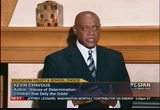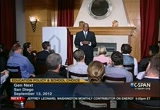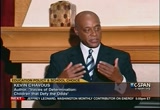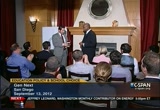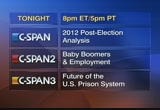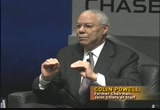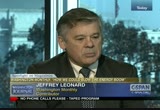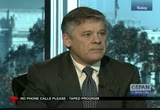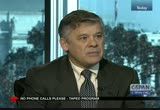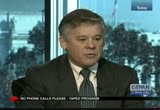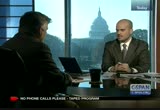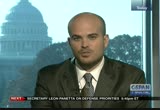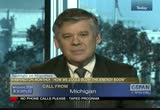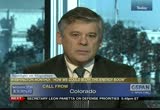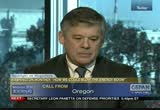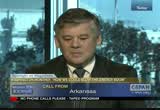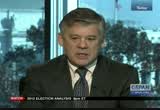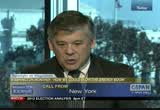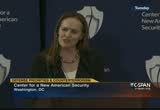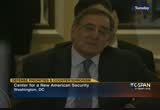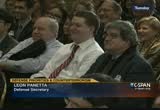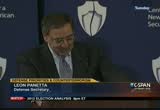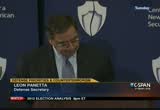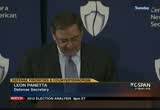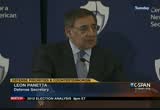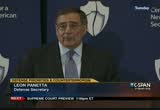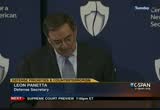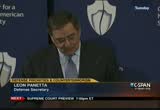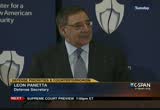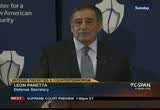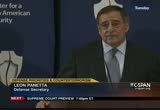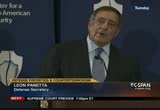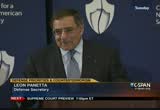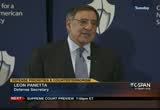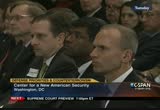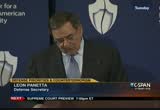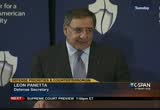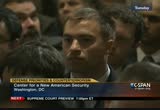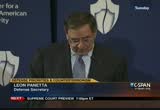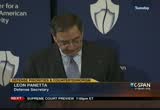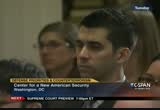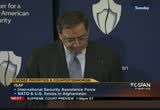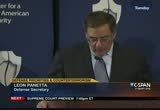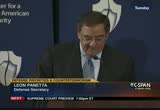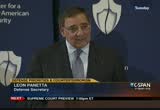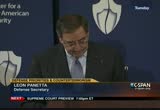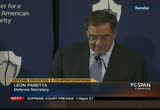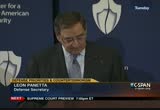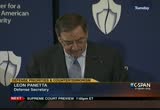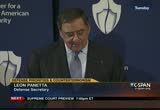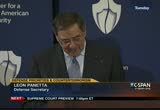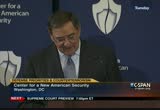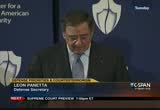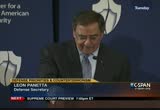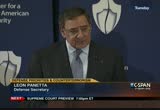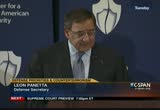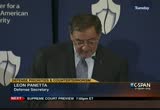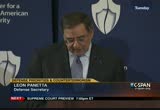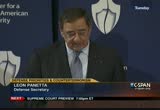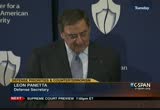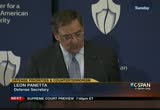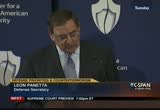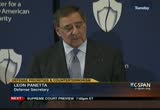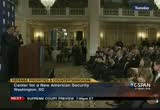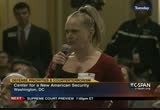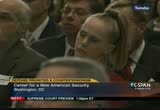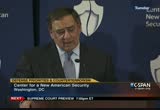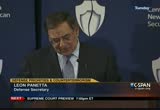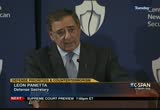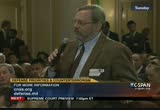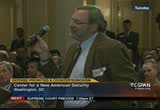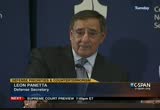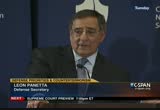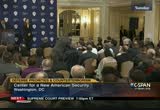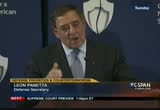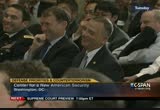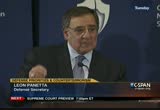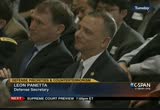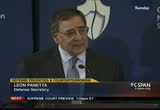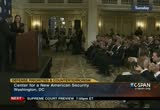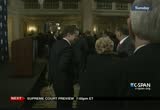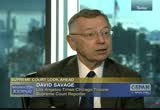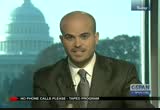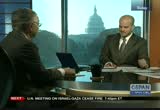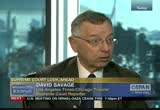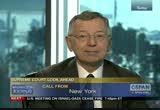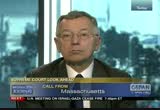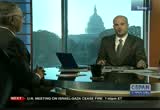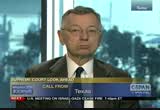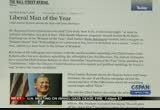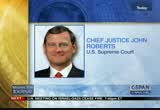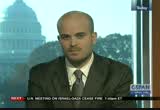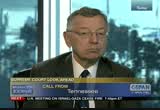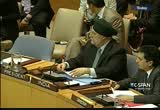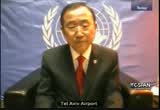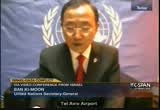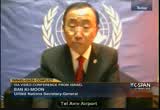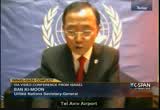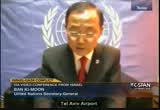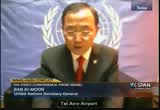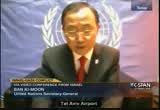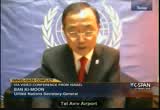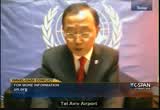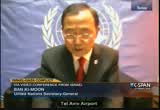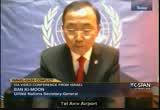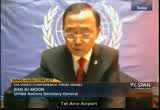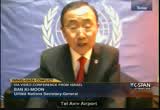tv Public Affairs CSPAN November 21, 2012 5:00pm-8:00pm EST
5:00 pm
those babies that may have been born addicted to drugs, that may have helped change their life trajectory. because in that early, fragile stage, just being held as one of the best things that can happen to each one of these children. each of us can help figure out how to help an individual child learn. >> i would like to acknowledge you for the work you are doing. it is something we all appreciate as we are busy running our businesses. and living our lives. i saw "waiting for superman." i had no idea about the things that exist in the system that are really devastating.
5:01 pm
as somebody with your viewpoint and seeing things all across the country, other any examples that are evolving that we can look at as an example of progress or success that we can look at and kind of understand, where is the hope in all of that. >> a great question. there is another great movie coming out, "won't back down." you have a teacher and parent schools. if real important. superman," i know all the sought, i needed to know whati found out she did get into school. florida is a good model. jeb bush is on another side of
5:02 pm
but he did a good job of forcing florida schools accountability. right now, several years later, the african-american kids' test scores in florida are on par with white kids in the rest of the country. by putting accountability in and giving some examples of opportunities for choice, he created an environment for these kids who are far behind and are now moving forward. some of the stuff done in new york was amazing, particularly the agree the principals academy, where he had a goal to get some of these strong principals to get into management sessions.
5:03 pm
he had a pipeline of them. those teachers put pressure on the traditional teaching pool to be better. the models are there. like it or not, most of education will be driven by state agendas. that is why the work you are doing here is so important. the state leaders have to be responsive to this issue. they need to put these kids first. we get them to do that, and we can change this. thank you. [applause]
5:04 pm
>> this is our custom, so you can write down your next speech. [laughter] you can enjoy a glass of wine. >> do you have a corkscrew? [laughter] [applause] >> and, cut. [laughter] >> a look at their prime-time schedules of the c-span networks. senior democratic and republican strategist analyze the 2012 election. c-span 2, a new stage of like discussion for baby boomers and what it means for employment and entitlement policy. c-span 3 a look at the u.s.
5:05 pm
pretences them and budgetary concerns. all of these that it o'clock eastern on the c-span networks. here on c-span, a program from "atlantic" magazine. and reached water talks about her cover story on the topic. that is that 9:00 eastern. -- at 9:35 eastern. >> go and find your soldiers and the labor market. the villages and towns of america. we did that. over five or six years we created an absolutely splendid force of young men and women willing to serve their country as volunteers. they had the same tradition, the same culture, loyalty and dedication of any other generation of americans that have ever gone before. they proved themselves in the gulf war, panama invasion, and iraq st 10 years anin
5:06 pm
and get a stand. we it to keep in mind is something prado begin said -- president lincoln said. it means never forget they are carrying the american spirit, the american traditions with them. when they get injured, when they get hurt, or when they come back to be reintegrated into society, we need to be waiting to care for them. not just the federal government, the veterans administration, fellow citizens. >> more about the rich -- the treatment of returning veterans sunday -- thanksgiving day at 8:00 eastern. later, space pioneers and nasa officials pay homage to the first man to walk on the moon, neil armstrong, just before 0:00.
5:07 pm
-- 11:00. next up, a discussion on u.s. energy policy and the energy grid. spotlighthis week's focus on the jeffrey leonard piece on the future of natural gas and the challenges of an aging electrical grid. jeffrey leonard, start with the first half of this equation and explain what you mean when you say that the natural gas boom could be the biggest game changer in global politics and economics in a generation. guest: things have changed so fast in the energy picture in the united states. a few years ago it seemed that we would need to import large amounts from abroad in order to meet our natural gas supply in this country. today there is so much gas available and more projected to become available in this country that it is creating
5:08 pm
opportunities for electricity generation for gas, creating opportunities for industries to go back to the united states. chemical, fertilizers, adding large amounts of money back into the economy. the energy picture looks a lot different than it did a few years ago. host: this natural gas boom that we have, why do you say we are in danger of blowing it? guest: there was a large amount of investment made in recent years to extract that gas. we are looking at different ways of using it. both the price and supply in the long term may be more constrained.
5:09 pm
guest: -- host: you also argue the problem of the aging energy trend. guest: is the transition to gas. this year a large portion of the energy produced in the united states, almost 50% is going to be produced by natural gas. a big change. a long-term evolution that we have been going through. coal-fired plants have been taken off line this year in record numbers. that has been made up by more utilization of existing natural gas plants. that is a good thing for the grid, it creates a lot of flexibility. the challenge that we have, as anyone living in the eastern part of the united states has recognized, is that the grid itself is very susceptible to
5:10 pm
storms and other kinds of power interruptions and catastrophic outages, such as cascading electricity blackouts, or even things like cyber terrorism. host: what would it cost to protect the grid against all of these different threats that you just ran through? guest: part of it is not so much what it would cost, as much of it is done over the course of routine maintenance. we simply have not made the reinvestment in the grid over many years. in the last few years there have been regulatory initiatives by the federal energy commission to try to enable utilities to be able to recover the cost of their investments in their rate base. that is a positive long-term trend. like health care, we can either pay for it through preventive maintenance or at the end, when we have catastrophic outages. host: the current system dates
5:11 pm
back to the 18 eighties. $673 billion in investment was needed by 2011, annual increase over current investment. service interruptions are projected to cost about $197 billion by 2020. if you want to join in on this segment and talk to jeffrey leonard, give us a ring. the phone numbers of their on your screen. we would certainly love to hear from you and chat about your questions. jeffrey leonard, a question of the natural gas boom, is there a danger of defending too much of natural gas? you talk about the last gasp of a natural-to gas in the 1990's. na -- natural dash to gas in the 1990's. guest: by the end of the decade, prices had gone up by 2.5 times because supply was in short order.
5:12 pm
many utilities fell burned by that and now they are cautious. if you speak to industry executives, they will say that gas is great and has been cheap -- and is cheap now, but was cheaper before. they need long-term short contracts for the delivery of gas at certain prices in order to build new power plants depending only on gas. host: fracturing is an issue that causes a lot of emotions for folks on both sides. this from tehran on twitter -- -- darryl on twitter --
5:13 pm
host: can you talk about the environmental concerns out there? guest: let me say a bit, i am not an expert in that area but i am an environmentalist and all my career i have been involved in the community. we have a lot of natural gas in this country. fracking is part of the issue, but not the whole thing. it is a dual concern. on the one hand, the economy is booming. people are finding the ability to lease their land and new employment is being created. on the other hand, people are scared and concerned of the environmental and other consequences. that thing leakage at the sites, there are many environmental issues raised. first of all, the techniques need to be regulated. we need to understand that the
5:14 pm
chemicals being utilized here, that our supplies are protected and so on. in general most experts believe that if we do this responsibly, we can do it without reducing dramatically the amount of gas available. without making absolutely sure that the truth out buyers in terms of environmental practices are regulated. host: we are speaking to jeffrey leonard, the author of the peace in "washington monthly." how we could blow the gas boom, that is the peace -- excuse me, how we could blow the energy boom. chairman of the washington month the board of directors, jeffrey leonard, is with us.
5:15 pm
john is next from grosse pointe, michigan. good morning. caller: i hope that you are having a good thanksgiving and please pray for our lions tomorrow. this is a good subject. natural gas is going to be with us, they will have to make it as safe as possible, the way that they extract it. the problem was going to be nuclear. it was completely a debacle. it diverted to natural gas. this was in california. it seems like natural gas was the obvious way to run energy in this country.
5:16 pm
thinking about the poll that snapped because of hurricane sandy in the new jersey area along a coast, they underestimated things like that. so, the broader issue is -- how does it work? who controls the rebuilding of our infrastructure? would it be wise to put money into these tubes -- these individual utilities? host: first of all, i wrote this piece. we were sort of talking about it. anyone looking at the big energy picture, not the individual pieces of energy, we spent all of our time talking about oil, gas, and nuclear. we debated about the environmentalists in the business community. we started to realize that, first of all, most americans get their energy from electricity. the change from this energy boom that we had of extracting record amounts of gas from the ground to plug in our homes, that really needs to -- it is
5:17 pm
the point that you raised about infrastructure. it is about investment in what we already have. about making the natural gas exploration, collection, and distribution system safe. that was a big concern by the last president, who did not have to worry about an energy crisis -- lyndon johnson, before richard nixon. in 1955 he said we had two critical infrastructure pieces. one, makes a the natural gas supply chain, the other is the electricity grid. we have not invested enough capital into those infrastructure areas. host: fred, denver, colorado. your on with jeffrey leonard. caller code does the improved technology -- caller: does the improved technology of shale
5:18 pm
extraction make to the keystone pipeline obsolete? -- make the keystone pipeline obsolete? guest: i am not an expert in that area. i wish i was. we will be conducting natural gas movements in this country, moving into new england. where we have depended on fossil fuels for energy supply. i do not know the answer on that. i think that there is a lot of energy around this continent, like canada and the united states. i would have to study that more to give a real answer. host: twitter, comparing natural gas to others out there --
5:19 pm
host: also, karl writes in on twitter -- guest: let me start with the renewable question. we should not be setting of renewable and natural gas against each other in the energy suppliers of the future. we need natural gas on the grid because we do not have storage on the grid. coal-fired plants, nuclear plants, the big load of plants in this country cannot fire up and fired down easily. therefore, because of renewable energy, those are not based load power. they cannot deliver, 365, a measurable amount of -- electricity.
5:20 pm
you need natural gas in the middle of that. many are talking about the need of the energy department and others to spend billions on new storage facilities. maybe in the long term they will come along when needed, but right now the most valuable up and down the hillside is up and down natural gas. we can only have more, and greater amounts of renewables, if we have greater amounts of natural gas as a substitute. you wanted to do extraction? i do not know the job count. i know that we are creating a lot of jobs across this country. there is a lot of exploration in oil coming up, which is obviously one of the reasons that gasoline prices may be falling, somewhat.
5:21 pm
i do not know the answer to that. since 1950 we have been gradually reducing our dependence on coal. that is a gradual economic transition that happens everywhere. if you look at your up, in my youth, in london people were dying from coleslaw because of the tremendous -- coal smog because of the tremendous amount that they used in england. host: david, good morning. caller: i wanted to say happy thanksgiving to you early. can i say that i think that it is wrong to bring up the presidency of lyndon johnson? most people back and did not
5:22 pm
have more than a television and a refrigerator, maybe some heat. that just does not compare to the energy needs of today. for my comment, what i wanted to say was with the cost of hundreds of billions of dollars to create a full infrastructure, would it not be less expensive, with higher yields, and better continuity if each home just created its own energy? if we removed the need of an -- for an all or nothing grid in this country and the investment would be back into the homes rather than the country? >> you have raised -- guest: you have raised all the different sides of the concerns i have wrestled with for years. you are right to say that in the age of lyndon johnson, we used far less electricity. your home today has 24 devices, 42 light bulbs, and countless other machines, like microwaves
5:23 pm
and so on, all of them running on electricity. while some use less than others, we use a lot of electricity. something like 45% of all homeowners leave the television on in the day time for their dogs and cats. we have become prolific users of electricity. if we lived in the age of lyndon johnson or before world war ii, we might have the technology to put natural gas in someone's home and they could use that to generate a small amount of electricity for themselves. the reality today is that we are not going to be going back to a point where everyone can generate their own electricity
5:24 pm
on a cost-effective basis for quite some time. those technologies that may come in the form of many other possibilities, hydrogen in the long-term. but today here and now we are dependent. if we can invest in the grid and make a grid smarter, using systems to manage our grid better, we can have much more ability to use micro review and smaller units and not have such a large interlinked bread where they are transmitted thousands of miles. host: profits are up, why does the private sector expect taxpayers to foot the bill -- she writes -- nationalize it. guest: the reality is that we do not need taxpayers to modernize the grid, the electricity industry has become the lowest of all industries in terms of reinvesting for research and
5:25 pm
development and new infrastructure on an annualized basis. i do not know if anyone heard the advertisement that the railroad industry is running. they said we were going to spend $23 million in reinvesting the freight railroad for the future. i started thinking about that. the freight railroad industry is much smaller than the electricity industry. utilities spend about $10 billion in reinvestment. we need a regulatory initiative to allow the utilities to recover the investments that they make in bonafide, long-term investments to the grid. yes, they will have to pay, but i think of what we've discovered with hurricane sandy
5:26 pm
is that consumers and taxpayers are going to pay through the nose if we just wait for disasters to occur. we need to reinvest in the grid. it does not have to be taxpayers, but will -- it will be a slow and long-term amortization through our electricity bills. host: how does that affect your work at the global environment fund? the growth capital investment oriented fund you are part of them of guest: our primary focus is on efficiency. -- part of? guest: our primary focus is on efficiency. from an excess of user energy to using it more efficiently, let's take a few statistics.
5:27 pm
the japanese industries will use far less per unit of output than in the united states. because the electricity has been higher price, they have adapted technology and industry has had to use technology that is far more efficient. much of our investment is on the efficiency area. we lose a lot of electricity between the point of generation and the point of view. ha ha we think, and i think in general that the long-term trend in the economy is toward greater efficiency. that is where i would like my investment dollars. host: tom, you are on with jeffrey, who wrote this story in this month's "washington monthly." guest: two issues that i want to speak about. i will give you -- caller: two issues i want to speak about. first, drinking water not been contaminated by the fraction process -- fracking process,
5:28 pm
this is nothing new. i had a friend who had a farm, 25 or 30 years ago he had a problem with the gas company having drill a hole in one of his pastures, contaminating the whole farm and its drinking water supply. this is not a brand new issue. this question of allowing these power companies to under fund the maintenance of their system, the rush to profitability in our generation is really astounding. the maintenance of their system, we are all paying for it now. host: -- guest: i agree with you 100%. we have all seen it in the highways in this country. the electricity is another
5:29 pm
example of underfunding. but as you say, these are private investments. these are not public investments. these companies distribute and charge us for our electricity. what has happened over the years, especially since president nixon, the changing regulatory climate in the natural gas and electricity industry. sometimes there is no question that many industry executives are to blame for failing to be ready for these storms that hit us. i served as the co-chairman of that team in maryland a few years ago. at that time when he ran for governor, he was very angry at the utilities and he said so in
5:30 pm
his campaign, saying that he wanted to hold the utility's accountable. that he did not want to raise rates. but what he has come to realize after this big inquiry into the storm in late june of this year is that we need to allow the utilities the ability to recover the costs of their investment in the grid. that is in the interest of the consumer. the job of the energy department is to protect the interest of the american consumer. that is something that we need to pay more attention to as citizens. host: don, kan., independent line. caller: as you were saying, natural gas is important. we can fire one up quickly. we could take an area of 90 by
5:31 pm
90 miles, produce not just the electricity, but all the energy the u.s. uses. it does not work at night, only when the sun shines. we need to start moving towards renewables as much as possible and putting public investment into this. we already face a climate crisis. the burning of fossil fuel needs to be done carefully. host: josh, north little rock, arkansas. go ahead. caller: just one comment before i get to my other comment, which will be short. i am a real road -- i work on the railroad, i was a look of it -- locomotive engineer. my other point that i wanted to get to, fiber optics, you can carry a lot of measures.
5:32 pm
someone made the reference a minute ago about the distribution point. i thought that i heard through fiber-optic the you would lose as much electricity. if this is the case, why not through a rural and electrification process, why not start burying them on the ground? we could put a lot of people to work. if we were to do that all over
5:33 pm
the united states, we would not have to worry about tornadoes and knocking down power lines or things like that. i would like to get your opinion on that. guest: natural gas is underground in many places. perhaps an efficient way to transmit energy. transmitted as far on these big lines that we are talking about. there is an inefficiency there. let's take a first question about renewables and your question in the long run, we are in a long-term evolution, and some of these technologies, even the renewable technologies are not as cost effective as they will be in the future. i am very leery about government choosing winners. once they start to subsidize, it freezes the cost point.
5:34 pm
a few years ago in my industry -- to be clear, i have invested in the industry over the years. the real dominant opportunity was plain old silicon based models. as long as the governments in japan were running these subsidy programs, they tended to keep prices high. prices have fallen dramatically in solar modules. we have technologies evolving, wind technology in tunisia, recently patenting a bladelets wind power generation system.
5:35 pm
i think we are in for a huge amount of new technology in the upcoming decades, but in the short term maximizing the amount of inexpensive cheap natural gas will only facilitate technology and develop -- development. host: richard, good morning. caller: good morning c-span, all the viewers. the federal government is leasing land and they call a federal land. well, that is not federal land, it does not belong to the government, it belongs to the people of the united states. it belongs to the people. why we are being shafted by these companies is beyond me. other countries look out for their people first. then they sell it on the open market.
5:36 pm
it is going straight down to the gulf of mexico. guest: you are raising a critical point that i think that we as a nation need to enter into a debate about. energy policy in general, and the public interest. as i wrote in my piece, there are all kinds of different possible demands for natural gas. we could export a large amount of it. in japan they would pay for natural gas made into liquids. this would mean that we were driving up the price in this country. these are public policy questions, there is the issue of regulation of the industry, the electricity industry and natural gas industry.
5:37 pm
they are scared they will get their fingers burnt, so to speak, because we might find we are exporting a large amount in the future and gaskets more expensive. these are the dates we need to have as a public. >> if it is so -- caller: if it is so possible, why not fund it? host: jeffrey leonard? guest: i would be cautious here. the budget is extremely constrained. the best approach would be to
5:38 pm
reduce subsidies and make the full cost born rather than the federal government subsidized. host: another piece the you have written about. we will now go to cindy. good morning. caller: good morning. this pipeline concerns me. but research i have done on it, general stephen anderson, setting back renewables by two decades because it goes straight down to the gulf. it is not for us and will not make any difference anyway. but the research that they come
5:39 pm
up with, they will be using their reserves. guest: to be clear, i am not an expert on petroleum exploration or the industry or the dynamics of that industry. i would say, to something that you said a minute ago in the comments, we cannot really affect the price of petroleum in the united states. it is a global commodity. you notice that this week, the tension increasing in the middle east, it is a global commodity that is subject to all different kinds of motivation -- variation. in natural gas we are self-
5:40 pm
contained. the price of natural gas in the united states today is much lower than the price in europe, japan, or elsewhere. host: and emory, dallas, texas, good morning. -- and memory, dallas, texas, good morning. -- anna marie, dallas, texas, good morning. caller: what can we do as a community to prepare? what are some things that we can do to perhaps -- me and a group of others -- we could create a project for awareness? guest: a great project for awareness is awareness about the distribution grid at the local level. in my area, washington, d.c., the utility for a variety of reasons and did not trim trees for decades. people complained because they were cutting trees and not want them on their property, so for the last few years with storms
5:41 pm
we have had an enormous amount of free-fall, branches, and so on. putting pressure on the utilities, running public projects, schools, so on, identifying areas that are vulnerable where a tree trimming process, and again, i am an environmentalist, i am not saying to cut down trees indiscriminately, but i am saying that there is a trade- off and if you do not do the maintenance at the local community level, there will be severe outages. the other thing is to focus on investment in our own area. we have seen the massive tangle of wires in our own areas. there's another one, then another one, and it is just a real mess. putting pressure at the local level on the regulatory authorities and utilities to
5:42 pm
maintain their own systems would be a terrific opportunity. host: joanne, new york, good morning. caller: good morning. about the fracking, i still have not made up my mind about it. there are so many details. could you gentleman tell me about -- i heard that it in the past was just what the other caller at -- had said, polluted the water system, but that in recent years there were two major companies doing it and they had cleaned up their act
5:43 pm
with the slogan that they want to do it right before the government makes them do it wrong. has the gentleman heard anything about that? these major companies being on the ball, doing what they are supposed to? guest: first of all, i wanted to remark that it is not a new technique. there are new algorithms that have driven exploration starting in texas a few years ago, but the recent boom in fracking has been smile by -- spawned by wildcaters. think of the gold rush in california. it was not some big corporation. most of the big energy producers were not oriented around new amounts of natural gas in the yukon -- the u.s.. there were responsible developers and irresponsible ones, and gradually there was consolidation. i was at a dinner a few years ago with chevron executives, sponsored by atlantic magazine. it was the day that the epa said they would regulate
5:44 pm
fracking. chevron said the that was great, because they could not do it unless it was done right or correctly. there was recently a showcase where exxon mobil people were saying the same thing. i am not defending or criticizing anyone's behavior, but we will be having a more regulated environment and those to step outside the regulations increasingly as a state and that the federal level will be fined or put out of business. >> victorville, california, good morning. -- host: victorville, california, good morning. caller: why could teddy roosevelt control the price of standard oil? no president since has been able to do anything like that. he could do it arbitrarily through executive order, breaking out all the big
5:45 pm
corporations, including the health insurance industry. but he will not do it. host: you are talking about a period of time when the united states overwhelmingly required two kinds of energy, cobalt and petroleum -- coal and petroleum. we were a huge producer and could affect the price. today, even though we may have become the largest producer petroleum in the future, as the united states of america in a free market and open world, we cannot control the price of petroleum. host: garth, logan, utah. go ahead. caller: good morning. listening to your program, it is quite interesting, one of the things that has not really been mentioned is the tremendous amount of regulation that you have to go through to license a small hydro or transmission
5:46 pm
line. i am an independent consultant for a company developing pump storage. the tremendous opposition from the environmental community, from the layers and layers of regulation and bureaucratic stonewalling from the government, this makes it very expensive and time-consuming. host: did you want to talk regulatory policy in the last minute? guest: i wrote another column about how difficult it was to be a small business person in the united states. first of all, amen to you. need more of those resources in this country. and we do need to be more sensitive. as a government, a public, to the challenges of investment in business in this country.
5:47 pm
host: the author is jeffrey leonard, the story is in "washington monthly." thank you for being here. guest: thank you very much. host: that will do it for our show today on "washington journal." >> malraux, the latest development in israel and gaza. tomorrow we will discuss party in the united states. after that, the executive director for the national congress of american indians explains with the fiscal cliff and native americans and the alaskan native communities. plus, e-mails, phone calls, and tweets. >> there are many people who
5:48 pm
might even take issue with great saving the union during the civil war. did it lincoln did that? he did. i will not a grant is the only person to save the union, but he was the commanding general of the army that would think the policy to affect, and he was the general who accepted the surrender of the army of northern virginia under robert e. lee that ended the war. if anybody won the war on the battlefield, if you could say that any one person did, and of course you cannot, but one of the things we do when history is we generalize, simplify, because history reality is simply too complicated to get our heads are around if we deal with it in the full complexity. granted save the union during the civil war, and i do contend he same award during reconstruction as well. -- he saved the union during reconstruction as well.
5:49 pm
jh.w.w brands of the light of ant.ses s. korgr >> the offense occurred predicted the defense secretary looked at how budget cuts could affect the pentagon. he spoke of the center for a new american security about the so- called fiscal quick and defense priorities. >> his resume is what i will call legendary. democratic senator. chairman of the house budget committee when they actually passed budgets. director of office of management and budget, and chief of staff to president clinton and white house. now, secretary of defense.
5:50 pm
the question, what in the world will you do next? this does not do justice to the man. he is a wonderful human being with many different facets, and in some ways, a man of contrast. i will give you a couple of examples. he is known for his warm, italian bear hugs. he is also known around the world for the laser like focus he displayed in hunting down osama bin laden. he often holds meetings in his pentagon office with his dog curled up around his feet as he vigorously presses a particular war plan will it be of particular interest. when traveling he is known to
5:51 pm
hang out in the back of the plane with staff and journalists. with a scotch on the rocks in hand. and waxing eloquent about what it was like growing up as an italian-american first- generation american on a walnut farm. just after hours earlier delivery cup talks on behalf of the president to some foreign leader. he is known for his colorful language when talking to the troops, and often for getting the press corps hang on every four-letter word. [laughter] he is also known for his passion for the stewardship part of his job. whether it is seeking to end at sexual assaults in the military or injured officers are trained to uphold the highest ethical
5:52 pm
standards, he cares deeply a genuinely about the men and women in uniform, their families, their service, sacrifice. wounded warriors, the trend. he has an easy laugh, but as he would say, he is serious as shit about protecting the united states of america. [laughter] he is a true patriot and a remarkable public service men. it is truly my honor to present to you secretary of defense, leon panetta. [applause] >> thank you very much for that kind introduction. i am always reminded of my
5:53 pm
father who i have said to many people was an immigrant from italy with my mother came over and eventually ran a restaurant in monterey during the war years. my earliest recollections were washing glasses and the back of the restaurant. my parents believe child labor was a requirement. then he bought a farm after the war. he planted walnut trees. i remember working in the walnut orchard. my father would go around when the walnut trees got older and would go around with the pole and hook and basically shake each one of the branches, and my brother and i would collect the walnuts underneath the trees. when i got elected to congress, my father said, you know, you have been well-trained to go to
5:54 pm
washington. because you have been dodging that it's all your life. -- nuts all your life. [laughter] i listened to the list of physicians, and i will tell you a story, when events occurred at the cia last week, my wife immediately gave me a call. [laughter] and she said i hope that there is no way the president is going to ask you to take that job again. i said i have been there, done that. michele, it babies and gentlemen, it is an honor to share some thoughts with you on
5:55 pm
some of the issues that we confront at the defense department. and also, if i might just take the opportunity since we're close to thanksgiving to wish all of you and your families and happy thanksgiving. michelle is a dear friend and a great, strategic thinker and a great public servant. obviously sorry to leave her see the -- leave the department of defense, but having been in those kinds of jobs most of my life, i understood the reasons why she felt she really wanted to spend some time with her family, and she deserved that. but i should tell you i continue to feel her positive impact throughout the national security community. she is always there. it is not only because of her time as undersecretary of defense for policy, should it is an extremely important position
5:56 pm
at the department of defense, but also because she is a co- founder of the center for new american security. you cannot walk for long at the pentagon and not bump into somebody from that organization. in a particular, jim miller it was now a successor for michelle and the position -- in the position of policy undersecretary. he, too, is someone i depend on every day to try to deal with everything from tremendous number of crises that we confront to the long term strategic challenges that we all flow how to discuss. i am particularly pleased with his leadership, which really follows in the footsteps of
5:57 pm
michelle, and his acumen and wisdom and all the qualities that i deeply appreciate. i spend a lot of time in washington, and you meet a lot of people, but it is the people who have a conscious and work hard at their jobs that are the most-respected people that you can work with. as we enter the second term for president obama, jim and so many others alumni will continue to play a very critical role in helping guide the administration's defense and foreign policy. with the election behind us, washington is turning its attention to the unfinished business, particularly the unfinished business of the current congress, including how
5:58 pm
to avoid falling off a fiscal cliff, how to prevent sequestration from happening and the impact that would have, not just on the defense, but domestic discretionary budget as well, and for our purposes, hopefully there will also take the time to pass a defense authorization in order to be able to set some important policy guidance that we need as we go into this next year. the hope is that obviously these issues can be resolved before the congress adjourns. and obviously we are all hopeful that the leadership will be able to come together to find a way to resolve these issues. these are tough decisions. i have been there and know how tough they are, but they can do it, they can do it. it will take some risks, but that is part of the game, yet to
5:59 pm
take risks in order to do the right thing. -- you have to take risks in order to do the right thing. the worst thing in my perspective can down the road. all that will wind up doing is continue to provide a shadow over the defense department, and the rest of government, as to what ultimately will happen, and damn thing ilast a.m need. the fact is when it comes to the challenges and opportunities that we face in the future of go beyond the gridlock, a political gridlock of the moment. they are significant. as we look to not just today, but tomorrow. in many ways i have said this, and i meet with the troops when i meet with them and the groups that i speak to, i believe it,
6:00 pm
this is an era of historic change. we are at a turning point. after 10 years of war, over 10 years of war, we have ended the war in iraq. nato conducted a successful campaign to bring down gaddafi . we are embarked on what i think is a good campaign plan to allow us to draw down in afghanistan, and we have a continuing effort against all kind of. -- against al qaeda.
6:01 pm
i would like to take a moment to express my pride in the men and women in uniform who have fought throughout the time putting their lives on the line to protect this country. were it not for their sacrifices, for their willingness to do that, we would not be able to accomplish what we have. thank god they are there. one thing i've found out is i have a lot of great stories of
6:02 pm
the defense department. --great toys at the defense department, but none of that would be anything without the good men and women in uniform who give their lives to protect this country. that is the real strength of the united states of america. as we transition to this new era, we will have to look at some important priorities that will take on greater urgency, particularly as we look at the second term of this administration and look at what are the challenges we are going to be confronting. this is not like the past where we come out of a period of war
6:03 pm
and the threats kind of and everyone winds up cutting out of the defense budget. this is a time where even as we come out of the 10 years before, we are confronting some major in theand major thruseats world. we still are involved in the war on terrorism. we are still at war in afghanistan, and as we try to draw down, we are in the process of trying to implement the department's defense strategy at the same time we are trying to meet fiscal responsibilities for .ou
6:04 pm
the budget situation in this country are limiting resources and will continue to limit the resources. i do not believe that we have to choose between our national security and fiscal security. we are implementing a strategy we put together in order to deal with the fiscal challenge we are presented. presented a figure of 480 trillion dollars to reduce the defense budget, and my
6:05 pm
approach was to say, we are not just going to cut across the board. every time we have come out of the war, whether it was a world war ii, the cold war, every time we cut the budget and hollowed out of force. we are not going to repeat that mistake. for that reason i said to my service chiefs we have got to sit down and try to develop a strategy for the future that will provide a defense force for the 21st century not those now but in the future, and we will build our budget around that strategy, so we all know we are
6:06 pm
going to be stronger. we are going to be leaner, but we have to be agile. we have to be deployable. we have to be flexible, and we have to be on the cutting edge of technology. we are going to have to have force projection in the areas with the biggest problem in the pacific and the middle east. we have to have a presence elsewhere in the world, and the credit of our military, we have designed a presence that will allow us to go into countries to help train, to work with those countries, to develop their capabilities, and it is something i have discussed when going to latin america. it is something i have discussed going into the asia- pacific region, and the fact is we are doing it in a way countries respond.
6:07 pm
they like the idea we are helping them develop print capabilities to provide for their own security. in i addition, we have made clear we have to be capable of defeating more than one enemy at a time, and this cannot just be about cutting. it has got to be about investing, investing in space, fiber, unmanned systems, investing in the kind of capability to mobilize quickly if we have to. those are important investments as well for the future, and most importantly, maintaining our defense industrial base in this country so we are not in a position where i am forced to contract out the most important defense capabilities i need.
6:08 pm
i cannot do that. i cannot just contract goes to another country. i have got to have that capability and the united states, so those are elements of the strategy. we built a budget cut looks at every area of the defense budget to analyze what do we do on structure, what do we do in what ionization and procurements? what do we do with regards to compensation bowman -- compensation? what do we do with developing the efficiencies? all of that was part of our budget. we are going to continue to work on it. we are dealing with the nuclear threat in a round. good -- in iran.
6:09 pm
we are dealing with cyber security. this is an area that represents the battlefield of the future. we have got the challenges of energy dependency. we have got to be energy efficient, not to mention the impact with regards to larger security issues. we have got to implement this balance to the pacific, something i talked about on this trip i just spoke to the pacific. this is my fourth trip to the pacific to make clear we are
6:10 pm
going to have a strong production to the pacific. it is important to our national security to do that in the future. in i addition, at the same time i have of course -- a force trying to rebalance to the pacific, i have a significant force in the middle east. a very significant presence throughout the area to deal with any potential threat we have to deal with in that region as well. at the same time with all those challenges, i have got to be able to take care of our service members and veterans and military families. the sacrifices they have made they deserve, but we stand by
6:11 pm
the tiananmen square we have made to them -- now that we stand now by the commitments we have made to them. we have got to make sure we provide the support system so they can return to their communities and families and be able to reestablish their lives. get all of that is out there. all of those are issues we have , and we have toommo be prepared to deal with it. tonight i wanted to focus on the goal but still remains on the top of the priority list, as it must. the goal of president made very clear that we have responsibilities to disrupt and ultimately defeats those who
6:12 pm
attacked america on 9-11 -- al qaeda. since september 11, 2001, our country has worked relentlessly to bring those responsible for the worst terrorist attacks in our history to justice. we have made very clear we are at war with south china -- with al qaeda. we have also made it clear that nobody attacks the united states and gets away with it. and we have made clear we will do everything possible to ensure such an attack never happens again. that means counter-terrorism will continue as a key mission
6:13 pm
to our military and intelligence professionals as long as violent extremists goes a threat to the united states, we have a responsibility to counter that threat. during my tenure as director of the cia and now as secretary of defense, i have truly been privileged to meet and work with thousands of professionals who have made this fight their fight, who have put their lives on the line for their country, and who have both the most effective global counterterrorism networks the world has ever seen. their work has made the american people safer, the united states
6:14 pm
more secure, and has put out tightening -- al qaeda on the defensive. with respect to core al qaeda in afghanistan, that is where the leadership after 9-11 found refuge. our military forces, our diplomats, our development experts have taken to the fight -- have taken the fight to leadership, first to operations on the border, and second, through a renewed, revitalized, and properly research efforts to help build an afghanistan that can secure and govern itself, and that is the fundamental mission to ensure the country
6:15 pm
can govern itself so it will never again become a safe haven for al qaeda. over the last few years, a kind of costs -- al qaeda's rigs have been decimated. it includes the loss of the top four of five leaders. through what has probably been the most precise campaign in the history of warfare and by partnering with local allies, numerous other experienced operational commanders in this region have been killed or captured. this pressure has significantly
6:16 pm
demoralizes and weakened al qaeda in terms of core capabilities, and it seriously disrupted their active blocking against our homeland. the broader military campaign in afghanistan has also been central in our efforts to dismantle and the ft al qaeda -- and the ft al qaeda. that is why 68,000 troops remain in outside the today -- in al qaeda today. together they are battling violent insurgency that seeks to topple the afghan government. they have not given up on that effort, and they seek to be able to return to afghanistan to provide sanctuary for extremists.
6:17 pm
if we are to defeat all kinda -- al qaeda, that cannot happen, and we remain determined to prevent all kinda from ever again launching a terrorist attack on america. since the surge troops were ordered by president obama and arrived in afghanistan, we have continued to put pressure on the taliban-led insurgency and dealt a real blow and made process, and i believe in and afghanistan that can secure itself against that threat. earlier this month and now i conducted an in-depth analysis. by nearly every indication, the
6:18 pm
insurgency has been significantly weakened. violence levels decrease in 2011 and 2012. the insurgency has been pushed out of centers and strategic areas. security dramatically improved this year in most of afghanistan's largest municipalities with the tax dropping 22% interval -- attacks dropping 22% in kabul. these signs of progress are real, and so are the challenges that remain. this is an insurgency that is resilient, and they will do everything they can to project
6:19 pm
an appearance of strength to the international community. the taliban claims responsibility for the troubling lies and insider attacks. they have launched a high- profile attacks, and they will continue to do that, but in the face of these tactics, they have been able to maintain strong international community and a strong commitment to finish the job. as the insurgency has been rolled back, we have vastly improved the capabilities of the afghan national security forces to maintain these gains after most of the international forces will have departed. every day, every week, every month, afghan forces are shouldering more of the burden.
6:20 pm
2011 i believe marked an important turning point because we were able to see afghan forces become operational and take charge of security. in 2012 that process took firm hold across the country. the transition is now well under way. we have transition to an area that involves 75% of the afghan population, and that population is increasingly secure. as a result, we are on track for two key milestones. will bethat the afghans levin leaving the country for security and afghans will ultimately take full responsibility for security by the end of 2014. after 2014 the united states has made clear through a strategic
6:21 pm
partnership agreement that we will maintain an enduring presence and a long-term commitment to afghan security, and nato made a similar commitment at the chicago summit last may. all of this sends a very simple and very powerful message to al qaeda, the taliban, and violent extremist groups who want to regain a safe haven in afghanistan. we are not going anywhere. our commitment to afghanistan is long term. you cannot wait us out. this is important because outside the, the taliban, and other associated forces -- because al qaeda, the taliban, and other associated forces
6:22 pm
continue to view the rugged terrain as a viable safe haven. our relentless counter- terrorism fed her conducted by our special operations forces this year made clear we will not allow them to regain that sanctuary. as our results of a prolonged military and intelligence operations, al qaeda has been significantly weakened. its most effective leaders are gone. shrinking.aven is how kind of possibility to carry out a large-scale attack on the united states -- al qaeda's ability to carry out a large- scale attack from the united states has been decimated, and as a result we are safer.
6:23 pm
these results are real, but it is important to point out even with these gains, the threat from al qaeda has not been eliminated. we have slowed a cancer, but we know the cancer has also metastasized. two other examples of the spreading presence, yemen and somalia. for years our eyes have been wide open to the growing capabilities of human-based al qaeda in the arabian peninsula, which has also targeted are homeland for attack, so violence and chaos in yemen itself. we have struck that in an effort to dismantle this group through
6:24 pm
a close partnership with the government of yemen. by training local security forces, we are building a counter-terrorism for sways to be the most effective over the longe term. by participating in joint efforts against key operatives, we have put unprecedented pressure on aqat and given the yemeni people an opportunity to free themselves from the grip of these terrorists. leaders who have targeted the united states have met their demise. innocent lives have been saved, but this has not been easy, as human cost government became destabilize last year. they attempted to seize the initiative, taking control of
6:25 pm
several key cities in the south of yemen. in the months since, the advances have been largely reverse through a renewed and even more effective partnership. our work in yemen is far from done. dismantling aqap, eliminating it as a threat will ultimately require sustained pressure, more u.s. assistance, a close partnership with the yemeni government, yet many people, and steadfast support. another country we have made progress in recently is somalia. for years i became director of the cia. it was obvious somalia was a failed state, a failed state where the militant group al-
6:26 pm
shabaab controlled large pieces of territory, declared fealty to out-, brought about by humanitarian crisis and planned to -- declared fealty to al qaeda, and brought about humanitarian crisis. now there, too, we have seen progress in large part because of the african union mission in somalia. the result is al-shabaab that has lost more than 50% of the territory it held in 2010. since losing control of mogadishu in august of 2011, hundreds of al-shabaab fighters have surrendered to forces. these forces recently took a stronghold and a number of strategic accounts -- towns.
6:27 pm
as a result, al-shabaab has diminished as a threat, and we continue to work every day to consolidate these gains to the terrorists. still, our challenge is far from over. yes, we have decimated of high- tech, -- estimated al qaeda -- dessimated al qaeda. yes, we have reduced the chance of a large-scale terrorist attack, but al qaeda has also adapted to this pressure by becoming even more widely distributed, loosely knit, and geographically dispersed. the fight against al qaeda has taken a new direction that demands we be especially
6:28 pm
adaptable and resilience as we continue the fight. president obama has made clear we will fight and not just through military means but by harnessing every element of american power. military, intelligence, diplomatic, law enforcement, economic, and above all, the power of our values as americans. i kinda has sought to operate in areas beyond the reach of affective security and governance -- al qaeda has sought to operate in areas beyond the reach of the effective security in governance. they are now seeking to take a vantage of the transition to gain new sanctuary and incite violence. know that al qaeda and its
6:29 pm
affiliates are looking to establish a foothold in other countries in the middle east and africa, including the group in nigeria. the international community and our regional partners share our alcern about molali, where qaeda affiliated groups have taken hold in the north. we are also concerned about libya. with respect to the attack, let me be clear. we will work with the libyan government to bring to justice those who perpetrated the attacks. to protect americans at home and
6:30 pm
overseas, we need to continue to pursue al qaeda wherever they seek to hide. we must be constantly vigilant. we must be constantly determined to pursue this enemy, but what will it take to achieve the end of al qaeda? first, it will be essential to finish the job we started and that we must complete in afghanistan. we are on track to do that. as we agree afghans need to be responsible for their own security by the end of 2014. this is our goal, and is the afghan hospital as well, but it will require a commitment in order to help afghan forces
6:31 pm
achieve that goal. give we have come too far. we have invested too much blood and treasure not to finish the job. there are no shortcuts, nor can we afford to turn away from this effort when we are so close to achieving success in preventing al qaeda from returning to this historic epicenter for violent extremism. we will need to maintain pressure on pakistan al qaeda- associated forces in somalia. that means remaining vigilant and working to build the capacity of our partners, including pakistan. despite challenges between the
6:32 pm
united states and pakistan, one area in which our national interests continued to align is defeating the terrorists on pakistan's soil but threaten both of us we remain committed to pursuing defense cooperation based on these shared interests. we must prevent the emergence of qaedafe havens for outal elsewhere in the world. the last decade of war has shown that coordinated efforts to share intelligence, to conduct operations with partners are critical to making sure al qaeda has no place to hide. we will expand these efforts, including through support and partnership with governments, in
6:33 pm
transition through the middle east and north africa. this campaign against al qaeda will likely take place outside combat zones using a small footprint approach that includes precision operations, partnered activities with special forces operations and capacity building so that partner countries can be more effective in combating terrorism on their own. wherever possible, we will work through and with local partners, supporting them with the intelligence and resources they need to deter, and threats. in mali, we are working with our partners in western africa who are committed to encountering the emerging threat to regional stability posed by aqim.
6:34 pm
in support of these efforts, we have to invest in the future. in military and intelligence communities and security partnerships. our new defense strategy makes clear, the military must retain and even build new counter- terrorism capabilities for the future as we reduce the size of the military, we are going to continue to round of special operations forces, which have doubled in size from 37,000 on 9-11 to 64,000 today. special operations forces will grow to 72,000 a 2017. we are expanding our predator and reapers over what we have today. these enhanced capabilities will enable us to be more flexible
6:35 pm
and agile against a threat that has grown diffuse. we are continuing to invest in building partner capacity, including through section 12 06 to train and equip foreign military forces. our new global security contingency fund has has been very helpful and placing new emphasis on cultivating regional expertise in the ranks, which brings me to the final point that too often takes a back seat in our operations against al qaeda. what do we do to prevent extremist ideology is from attracting new recruits in the future? over the past decade, we have successfully directed our military and intelligence
6:36 pm
capabilities at fighting terrorism, yet we are still struggling to develop an effective approach to address the factors that attracts the young men and women to extreme ies and to insure governments and societies have the will to counter and reject violent extremism. to truly and the threat from al qaeda, military force will never be enough. the united states must stay involved and invested through diplomacy, through development, through education, through trade in those regions of the world
6:37 pm
were violent extremism house floors. that means continued engagement -- has flourished. that means continued engagement. continued engagement in pakistan, following through on the efforts we have made in afghanistan to their long-term stability. secretary clinton has also outlined a comprehensive strategy in northwest africa combining security assistance, economic development, strengthening democratic institutions, advancing a political reform these regions are undergoing when a historic transition that offers many in the region a hope for a better future, that these changes, and less influenced by the international community, could result in greater turmoil -- on less influenced by the international community, could
6:38 pm
result in -- unless influenced by the international community, could result in greater turmoil. the libyan people have turned against violent extremists who killed them. we will be vigilant. give we will posture our military and intelligence forces to prevent and if necessary response throughout the middle east and north africa, including threats against embassies, consulates, and diplomats themselves, but to truly protect america, we must sustain and even our engagement in the world'. military and diplomatic efforts are key to doing that.
6:39 pm
we are confronting a number of challenges in the middle east and north africa. at some point we must find ways to peacefully resolve the war in syria, the conflict between israel and the palestinians, the threat from iran and. every time and over time we must also address the differences that create tension and that are exploited by extremists. as our country emerges from the decade of large-scale conflict, confronts a new fiscal constraints at home, i worry that our political system will prevent us from making the investments in diplomacy and development we need to ensure we
6:40 pm
protect american's interest in these volatile regions of the world. these investments lack a constituency in congress at a time of great fiscal pressure. we face the prospect of budget sequestration that would be devastating to national security, not just because of what it does to national defense but also what it does to these programs that support diplomacy and enhance our quality of life. men and women in uniform know too well what sacrifice is about for our nation. for more than a decade after we were attacked on december 011, bley have fought, they have le d in distant battlefields.
6:41 pm
they have made our country safer. if we turn away from these critical regions, we risk of doing significant gains they have fought for. -- the ongoing significant gains they have fought for. that would make us and save. this is not a time for isolation. it is a time for renewed engagement and partnership in the world. after iraq and afghanistan, we are entering a new and different era, a multitude of different threats and challenges. the united states military must prepare for these challenges, and we will, but america must continue to lead this fight against al qaeda. and our partners demand it, and our fellow citizens demanded.
6:42 pm
september 11, 2001, the united states was thrust into a war we did not ask for, nor did we seek. over 11 years later we fought back with a vengeance to make clear we would do whatever we must to make sure 9-11 does not happen again. we have made america a safer. we must not rest until we have made america saves. -- saf today and tomorrow. thank you very much. [applause]
6:43 pm
>> secretary panetta has graciously agreed to take a few questions from the audience. of when i call on you, please tell your name and affiliation and remember to ask a question. gooright here. >> i am the executive director of the nonprofit, but most importantly, i am an 11-year army wife. we have talked about the mental health of challenges facing our troops and their families. you know the numbers as well as i do, 18 veterans' a day, and i know three army wives who have
6:44 pm
killed themselves. i bring this up because i believe it is a national security issue and not just a moral obligation. we have never spent this much money. we have never had an unprecedented effort to try to stem the tide of suicide and mental health challenges we are facing. i wanted to ask you about a different strategic approach to the problem. i feel like we need someone with a direct line of report to you that this is their only job. there are precedents to this. >> if we could -- >> the point is i feel like we have a lot of efforts going on the turn not connected, and if
6:45 pm
we had a leadership just connected to this it would probably make a huge difference in our lives. >> thank you very much for that question. the defense department is a big bureaucracy. we have about 3 million people, and they are very dedicated people. they are very dedicated professionals, but often the ability to focus on a problem and be able to deal with it suddenly requires we have got to change direction and understand who they are dealing with something that is a serious threat, and that is the way i feel about the mental health problems that are impacting our forces.
6:46 pm
part of this is the impact over 10 years of war and the stress that is involved in the clement after deployment -- involved in the employment after deployment. part of it reflects the stress in society in general. in many ways when you look at our suicide rate, if you look at the general society, there is an increase in suicide rates as well, part of its due to family stress, part of it due to drinking, part of it due to drugs, part of it due to financial stress, and there are a whole series of issues that play a role in creating this kind of pressure. given the fact is when it comes to mental health, i wish there were a simple silver bullet that could deal with this problem, but it is complex, and there are
6:47 pm
a number of factors in play, but that means we have to devote every resource we can to try to deal with that, and i think it is important to be able to increase the amount of mental health professionals the deal with this problem, that can provide guidance, that can understand what needs to be done. we can also increase your awareness of what is going on so they can spot the problems and be able to deal with it. one thing we have sound is we have got to be able to have those at the platoon level, leaders who are looking at the people they are responsible for, looking in their eyes, seeing the potential problems, and
6:48 pm
being able to respond, and all of this will require additional resources in order to respond. i do believe to create a focus on a problem like this does require we do everything possible to insure it is not an issue we talked about today and forget tomorrow. good one of the things i have done which chairman of the joint chiefs is we have got to stress this issue and continue to look at it, and what i have done with my undersecretary is to say, i want regular reports on what is going on. i want to know what is happening i want to know what we are doing to confront it. frankly, the person responsible
6:49 pm
is me, and i have got to make sure something is done about it, and i will, but i also have to make sure everyone else is responsible for each of the services. [applause] >> right here. >> mr. secretary, thank you. i am resigning next door. thank you for all the hard work you put into solving so many problems we face. in 1998 we dealt with yankee's -- y2k and found out a lot of
6:50 pm
things from those exercises. you came out with an instruction to weeks ago yesterday, which we applaud, having to do with supply chain integrys steve. -- integrity. what links these is we lack the resources in the united states to solve the problem. today we have divergent policies directives, not intentionally so, but that deal with the matter of reducing the cost of services the department has to buy through the efficiency memo essentially juxtaposed through the need of this expertise.
6:51 pm
the question is can you marry the efficiency memo and the new instruction on supply chain so we do not lose the talent that resides within the department, much of which is older men and women who will leave? >> i think we have got to continue to emphasize this area. expertise in this area is something that is not easy to come by, and you have got to build people who know the systems and have to understand what is involved with it, and it is something generally in
6:52 pm
government service we build expertise only to have it moves on, and then we have to recreate it all over again, and that is a terrible mistake. what we have got to do is build expertise and hopefully continue to inspire people. this is an area of dealing with computers, of dealing with the threat we face, but also dealing generally with novel cyber world we are involved in. this is an area of the demands -- the demands tremendous capability. we have tremendous experience. we have got good people involved, but if we are going to stay on the cutting edge of what is happening with regards to the changes occurring, we have got
6:53 pm
to invest more in that area. nike alexander is a bright guy. he is a capable person. i have got to make sure we understand behind him are done people who can guide us to protect this country in the future. this is a complicated area. what is most disturbing of all is when i try to get help from the congress, they walk away from this issue. they refuse to pass legislation that would assist us. i have got to be able to have the private sector working with us when it comes to these issues to develop that kind of partnership, and i cannot have the private sector help us provide information on what is happening unless i protect them
6:54 pm
from lawsuits and from litigation. that is the whole point of this legislation, and i cannot understand why it is so hard for congress to do the right thing. >> we are going to have a competition on who can frame the question most succinctly. tony, you are the first contested. -- contestant. >> when it was first rolled out, there were a lot of concerns the united states was hinging too much strategy on pakistan. what chance will the u.s. have to succeed in 2014 if the safe havens are not dealt with more strikingly than they are today?
6:55 pm
>> in many ways the success in afghanistan is dependent on having a pakistan that is willing to confront terrorism on their side of the border and prevent safe havens. i think right now the ability to develop a security force in afghanistan that is able to provide security that can establish operational capability to confront threats on the afghan side of the border is extremely important to the future. we are building this force. that is extremely important to our ability to make the transition and have an afghanistan that can provide
6:56 pm
security. that is going to be an important key, but to be able to succeed in afghanistan is also going to require -- the threats ic to worry about in the future are the following. we have to have an afghanistan that can govern itself, that can move away from corruption, that can have the capability to provide the kind of governance you need to secure that country and govern that country for the future. that is an area that demands a lot more effort for the future. the other is the ability of terrorist groups to move across the border and attacked in and obviously the challenge that represents. we can take them as they crossed
6:57 pm
the board. the problem is when they moved back in the state to a safe haven, it makes it difficult. in order to have a secure afghanistan, pakistan is going to have to take responsibility. >> last question. >> thank you for joining us. what can and will you do in the next administration to break the logjam and get the laws of this city ratified? [laughter] >> this may require tanks and
6:58 pm
bombers. this is really one of the most disturbing things -- i talked about one of the national security threats is the question of whether or not the leaders we alike can in fact mcgovern -- government and can deal with the challenges the face this country. when i go abroad, i just came back from asia, and i was meeting with the defense ministers, and one of the defense minister said it is great you are going to the pacific, but can you sustain that when you have a congress that is sequestered to walk off a fiscal cliff. now i said, that issue, whether of our democracy can truly
6:59 pm
function and have leaders ready to make the decisions the need to be made in order for the country to govern itself is the issue that will determine if we have national security, and it is the same overseas. i go to the asia-pacific region. they are having territorial disputes over these rocks, and obviously, it is about the resources that are offshore, but they are having these disputes over these areas. we have to maintain freedom of the seas. frankly they looked at me and say, what are you talking about? how can you tell me
7:00 pm
you haven't approved the law of the seas treaty. how can you tell us what the hell to do here? they're right. they're right. we are the only industrialized country that has not approved that treaty, the only industrialized country that has not approved that treaty. in order for us to have credit built to be able to argue about freedom of navigation, maritime rights, that is essential, in order for us to deal with the challenges that we are facing as a result of global warming and the northwest passage and potential for resources out there, there are countries that are making claims there and we can't even engage with those countries because we haven't approved the law of the seas treaty. it's an outrage, outrage that we have not done that. i think there are good members up in the senate who agree with everything i have just said but constantly running into a wall because of some ideological reason for a few members this has become an issue they are going to fight and they are going to stop as best they can. but if this country is to provide leadership in the 21st century, if we're to do what we have to do in trying to guide
7:01 pm
countries so that they in fact are able to protect their interests and be able to engage in the kind of commerce and economic development that is important for the future, if we're going to be a part of that, then we have to be credible. and that means that we need to pass the law of the seas treaty. i hope that ultimately happens. coming out of this election, i guess my prayer, my prayer coming out of this election is that leaders on both sides recognize that the one message the american people sent is for the leaders of this country to do their job and govern this country. that's the message they need to understand. thank you. [applause] >> mr. secretary, thank you so much for being so generous with your time tonight, thank you for your
7:02 pm
strategic insights, for your candor and for your service and thanks for you coming out the week of thanksgiving and i hope you have a wonderful thanksgiving and thank you for hosting us here tonight. good evening. [captions copyright national cable satellite corp. 2012] [captioning performed by national captioning institute]
7:03 pm
>> strategists analyze the 2012 election. baby boomers and what it means for employment and entitlement policy. a look at the future of the u.s. prison system and budgetary concerns. all of these events start tonight at 8:00 eastern. next, a look at the coming months. this is 40 minutes. supreme court will be doing in savage of the los angeles times. you wrote this month that this
7:04 pm
court? guest: college affirmative action. that affects the south. and next week, gay marriage, the court has a bunch of appeals to take on the gay marriage question. those are three pretty good ones. host: political through them one at a time. the voting rights act was picked up by the supreme court justice couple days after the election. guest: correct. this is a little like the affirmative action question. civil-rights remedies from the '60s and the question is, is it still needed today? part of the voting rights act in 1965 outlawed racial discrimination in voting but it also put most of the south under a sort of federal scrutiny, which basically said if you are a small county in alabama or a city and you want to exchange your election laws or voting laws, you have to basically get it cleared ahead of time in washington and send some sort of form to the justice department to explain what you
7:05 pm
are going to do or you could go to a federal court. the theory was for 100 years, even though racial discrimination had been outlawed by the 15th amendment, a lot of cities and towns that control the voter rolls had various schemes that prevented blacks from registering to vote, so the federal government -- this is an unusual law to say we are going to put a whole part of the country under special scrutiny of the federal courts. that law still exists. the voting rights act. it still is the case, if texas wants to change its congressional districts or have a new voter id law, it needs to first get it cleared by
7:06 pm
washington. host: how many states are we talking? guest: there are nine states, i think, covered by the law. the formula, i can tell you the simple part of it. it is the deep south. from there it gets very complicated. there are five counties in florida, not the other 62 counties. there are some counties in california and new york. if in the early 1970's congress updated the law a little to take into account areas that had spanish-speaking or non english- speaking voters who were not registered. there were brought under the law. they said you are doing a poor job of registering nine english-speaking voters. so there's a couple counties in california. and in new york. for the most part, the law is still as it was in 1965. host: congress approved this law for another 25 years recently?
7:07 pm
guest: absolutely. almost a unanimous vote. the senate passed it unanimously. i think the reason is this law was so important in american history. everybody agrees, even the people who don't criticize it today agree that the voting rights act was one of the great civil rights laws of american history, because it really allowed minorities to register to vote and have their votes count. they could actually win seats in the city council or the county board. the only question now is, is it outdated? is it unfair to treat texas differently than ohio or south carolina different from indiana? that is the question the supreme court will take up. congress approved it. the conservative members of the court might be inclined to say this is a good law but its time is past and you can no longer put the deep south under this special scrutiny. host: we are talking with david
7:08 pm
savage of the l.a. times -- the chicago tribune, i should say. he's the supreme court reporter. if you have questions about the upcoming session of the court, give us a call. the numbers are on the screen. before we leave the voting rights act case, who brought the case before the court? guest: shelby county, alabama. it is an unusual case in the sense that they are challenging it on its face. they did not have a particular case. they simply said that they believe this lot is unfair and outdated and they should not have to ask washington's permission before they changed the voting rights laws. so it is a challenge to the essence of the law. saying it is unconstitutional. host: the pending decision on college affirmative-action. when is that decision expected and what sense did you get this from the justices when the case was argued? guest: we can never tell when they will decide the case. it's always hard to guess. if they are divided, it frequently takes many, many months. it could come late spring. if this order agree, it can happen pretty quickly. the case was argued in october. the issue is, in the past the supreme court has narrowly upheld college affirmative action. it has done so on two premises.
7:09 pm
one is that racial diversity on campus is is really important. we don't want all white colleges and universities. very important to have minority students and have some diversity. and the only way to get there is to have some racial affirmative action. the case they taken up from the university of texas is different in one way. about 15 years ago the texas legislature passed a law that said if you graduate in the top 10% of your high school class, and you are entitled to be admitted to the texas universities, including the university of texas in austin. that law over 15 years has really changed the university. a third of the students now coming in are hispanic or blacks. almost all those students come in under the top 10% law. the reason it is important is justice kennedy, the middle vote on affirmative action, has
7:10 pm
always said something like i think there's a need for diversity on campus, but a race-based program should be the last resort, it should be the last option. so the question before the court in this case is, if texas has achieved a very good level of diversity using this top 10% plan with no preference is given to minority students, they got their own merits, they graduated in the top 10% of their class, can you have an affirmative-action plan that considers race? texas wants to do both. a sense of the argument was there are five justices, conservative justices are inclined to rule against texas and the hard thing to date is whether they will issue a broad decision or in narrow decision. they could write a narrow opinion that's almost a texas- only case. passaic, texas, you achieve diversity, you cannot go further and have an affirmative action plan. they could write it border and
7:11 pm
say every state university in must try a race-neutral plan, must try something that brings in minority students without race. that would have a big impact. host: is this court more likely to issue a narrow opinions or the broader opinions? guest: it's hard to say. i've seen both. that's one of the things that's really hard to gauge, because you have five people sort of agree on the result, but they disagree. with other disagree
7:12 pm
and so, that's one of the ones where my impression is that the justice kennedy would like to say something that is a little bit more narrow. some of the more conservative justices scalia and thomas, have been very clear about this. they say no race-affirmative action whatsoever. they say you cannot use race under equal protection of the law, so affirmative action is out. i don't think justice kennedy would want to go there. but i can imagine him writing a decision that would say, if you are university, you have to try other means to bring about diversity on campus before using race as one of the admissions factors. host: before we move on to some of the other cases, let's take a few calls. henry is from new york, new york, on the democratic line. caller: thank you. i'm on the road right now on
7:13 pm
interstate 40 just north of nashville, tennessee. [indiscernible] at decatur county, tennessee, my assertion is the issue of race and the civil war is still so passionate in this region. i will be brief. "our civil war heritage, the cavalry in tennessee, the historical museum --" it lists the people's names who fought in the cavalry. in other words, the issue is not dead in terms of passion and relative to bias. guest: interesting comment. some lawyers say things have changed and we don't have blatant racial discrimination like we had years before but they will tell you about a series of cases where things have happened in small towns and counties.
7:14 pm
for example, a black person looks like he will be elected to the county board and the board says we will change the voting rules so we will elect everyone at large rather than by district. in that case, you have to have more than 50% african-americans for an african-american to win a seat on the board. the impact of that would be to prevent a black person from actually winning a seat on the county board. those kind of things don't happen often but every so often they do happen and the argument for the continuation of the voting rights act is the federal government should be able to stop that before those changes are made. host: you talk about justice kennedy being a key vote to watch. who are the key justices you are looking for on the voting rights act case?
7:15 pm
guest: it is almost exactly the same period is five more conservative justices, justice scalia, justice tom thomas, just as alito and the important ones, justice roberts and justice kennedy. the hard question for john roberts is what you mentioned early on -- i think john roberts would think there is something wrong with keeping the south under this special scrutiny. the hard question here is
7:16 pm
congress did authorize -- re- authorize this law for another 25 years. kennedy and roberts, a one has addition they will have is to ask whether should the supreme court stepped in to strike down the law that congress has passed almost unanimously? host: back to the phones, terry is waiting from pennsylvania on the republican line. caller: thank you, david, when you first started talking, you were talking about the election laws. you made the comment that the
7:17 pm
reason for the lobbying in active was the supreme court made the comment, i think it was california you said, that they were not doing a good enough job of getting non- english speaking voters to vote3 is that true? guest: yes, that was the issue in the early 1970's. it was the coverage formula which was changed. i don't know the history well but the issue then was that in a lot of counties in different parts of the country including california there were language minority voters who were not registered and not voting. congress said we have been concerned about african- americans not registered in the
7:18 pm
south to vote. we want the states and counties to do better on that and we will also say the same about the counties that have not registered and voted qualified, eligible language minority voters so we will put them under this special scrutiny until they do better at registering language minority voters. host: did you have a follow-up question? caller: yes, that comment flies in the face of logic. in this country, in order to vote, you need to be a citizen.
7:19 pm
in order to be a citizen, you have to speak english. guest: we are only talking about citizens. you're not eligible voter if you're not a citizen. this is a question of people who were citizens and were not registered to vote. i think it was a mechanical formula that looked at the percentage of what they call language-minorities who were registered to vote and sort of put the county under some scrutiny. nothing in particular happened to but they wanted those counties to do a better job of registering language minority voters. it was only citizens, not people who were not citizens.
7:20 pm
7:21 pm
democratic line. caller: thanks for taking the call. you answered my question about the argument for voting rights. are there any cases coming down the line that they will address more that are controversial state initiatives like the gay marriage or marijuana initiatives. here in maryland, we had the state college tuition for the kids of legal immigrants, thank you very much. guest: those are not at the court yet but the gay marriage question certainly is. next friday, the court has a series of pending appeals on the gay marriage question. two big issues -- one is the case of legally married gay couples -- there are now nine states where gays and lesbians can legally marry. marriage is usually a state law matter but under the federal defense of marriage act, a law passed in 1996, the federal government does not recognize those marriages. in that situation, a gay couple who is legally married in boston, cannot file a joint tax return. they cannot get benefits under social security for their spouse like another merit couple would. a series of lawsuits have been filed a federal appeals court in boston and new york ruled tartabull law is unconstitutional. it denies gays and lesbians equal protection under the law. they are legally married. the court said they deserve the same legal rights. the obama administration would
7:22 pm
not defend that law. the house republicans appointed john clement. many of those cases are under appeal and they will surely decide one of those cases this spring host: is there one more likely than the other? guest: that is an inside baseball question. the problem that arose is that elena kagan was the solicitor general when some of those cases were beginning and she mentioned at her confirmation hearings that she had participated in discussions about one of the cases. i think what the court wants to try to do is find a case where she came later and had no involvement. you want nine justices. they don't want age. you could get a split in the would not decide anything. host: she would be one of the key votes to watch? guest: when it is a close vote, every vote is a key vote. in answer to your question, there are several cases and it
7:23 pm
is not a matter of a good or bad case. one of the deciding issues will be of justice kagan participated. when eight supreme court struck down an act of congress, they almost always hear the appeal. that law is constitutional in parts of the, -- country and unconstitutional in boston and new york so you cannot have that. the court will take up of those cases. host: the california prop 8 could come up as well? guest: that is a bigger question. that is the question of gays and lesbians having the right to marry. the last case was gays and lesbians being already legally marry. this is the first to get to the supreme court that directly
7:24 pm
opposed -- poses the question -- is unconstitutional -- is it unconstitutional to ban the marriage of gays and lesbians? the federal judge in san francisco struck down below. the ninth circuit agreed on a two-one voter in the road a fairly narrow opinion but the question for the supreme court is -- they have several choices -- they could grant that case and decide in a big way whether denying the right to marry for gays and lesbians who violates the equal protection clause. they could take it up and decide it narrowly and say that is what the judges in the ninth circuit said. for a brief time, gates could mayor in california thanks to wasa state supreme court
7:25 pm
decision. the voters passed proposition 8 which took away that right and the ninth circuit said you cannot take away someone's rights. that was a narrow way to resolve the question. it is also possible that they might get together and for different reasons the justices will say -- let's steer clear of this case and denied the appeal and in that case, gay marriage would then become legal in california but the supreme court will not have decided the question for all the other states. host: we are talking to david savage, the supreme court reporter for "the l.a. times" and chicago tribune. next is on the independent line. caller: thank you for having me. i am an african-american. and 48 years old. i had a comment regarding the upcoming affirmative action decision. in hindsight after looking at it for a long time, i see a lot of these programs that were instituted were insufficient. it has been shown that the beneficiaries of the program are largely people who are
7:26 pm
african-american even though the good reporter mentioned african-americans several time when he was describing that particular decision. even when you mentioned the affirmative action in texas and how the top 10% are automatically eligible to attend any of those universities, the problem is, if the high school curriculums -- they are three years behind in the inner city schools -- you are setting people up for failure. as much as things change, the more they stay the same. we are stuck in a system where i don't have representation, where i am still blocked from
7:27 pm
economics, by ability, -- viability, so the struggle continues. host: how big is the scope of some of these cases? the caller brings a problems going back to the high school curriculum. as that, in any of the arguments with the supreme court? guest: yes, in the texas case, that was exactly the criticism of the top-10 plan when it was voiced in 1996. a lot of university officials said this will really not work because you will bring in kids from inner-city high schools. the rio grande area in south texas has a lot of mexican- american kids. they feared those kids would not do well but the encouraging news is that over the last 10- 15 years, the graduation rate
7:28 pm
at the university of texas has gone up steadily and a lot of the students coming in, black and hispanic, have done very well they did much better than you guessed based on their sats course. the use of -- the university put out several studies that said we have been heartened by the fact that students who worked hard and got good grades in high school may not have been at the top of the choice normally because of their s.a.t. scores but eventually did well in the university of texas. the criticism is always or raised in these top 10% plans that it cannot work in many places but my understanding is from what people in texas say, it has worked pretty well at austin. host: from omaha, neb., on the democratic line. caller: thank you for having me.
7:29 pm
i called about the voting rights but that has been answered so i want to talk about affirmative action. i know there are more than african-americans the benefit from it. i understand the top 10% automatically get into university in texas, however, is that overall for all of the high schools or just a tick -- -- or just particular i schools? if i put out an application that i am african-american or hispanic or whatever, without affirmative action being in place, with that effect my application? host: do you know the details of the case to that level?
7:30 pm
guest: i know some of the details. a federal appeals court had invalidated affirmative action in texas in the mid-1990s and that is how this program can about. it was a substitute for considering race. that is how it got under way and it is now about 3/4 of the class that comes in based on what is called automatic admits. they have actually loaded to the top 8%. regardless of what i saw you go
7:31 pm
to in texas, if you graduate in the top 8% of your class, you could get into ut in austin. they set aside 1/4 of the class where the university has some discretion in and letting students and the university says that is where we want to consider a student race. we want to be able to consider those things. university officials say we need some discretion. if we get a kid was interested in architecture for outstanding in music, we want to be able to pick that kid if they are not in the top 10%. so, too, if we find a very talented african-american student or a latino student who is in the top 15% of a very good high-school in dallas or
7:32 pm
houston, we want to be able to admit that students. the university of texas is saying we want to consider race sometimes and that is what the dispute is about. the critics say, no, it is wrong to consider race and you don't need to do it in this case. you've got a reasonable amount of racial diversity. host: let's turn to another case --
7:33 pm
as you enter that, i will show that had line from "the wall street journal." guest: don't know the answer to that question. i think it would be unlikely, however. justice scalia is 76 and justice kennedy is 76. they are both generally on the right side of the court. justice ruth better ginsburg will be 80 in the spring.
7:34 pm
she is the oldest of the justices on the liberal side. if you had to guess who was going to leave in the next four years, i think the standard guess would be justice ginsburg. it was very important for the ideological makeup of the court whether barack obama or mitt romney is president of united states because it justice ginsburg had left and another conservative justice came in, that could have changed the balance of the court. if, in the next four years, only justice ginsburg leaves, the presumption would be that president obama would pick somebody else who is relatively liberal and that the ideological balance of the court would not change. it would be a big deal if justice scalia or justice kennedy for one reason or another left and were replaced by obama -- an obama appointee. i would not bet on it. host: we are taking your calls on the supreme court in the near term and longer-term issues. john from texas on the republican line is next. caller: good morning, i am very familiar with the hubbub about the affirmative action deal in texas. i'm a former teacher. we have an inconsistency in standards among our bicycles. students graduating from high year to year high schools are much better prepared for college than kids from the inner cities. what we found is that universities are admitting students who are not well qualified based on the affirmative action. they are finding that many of the students coming in under that role are failing in their first year and not becoming good students. we want the affirmative action thing gone to where we only add that qualified students who have high s.a.t.'s, high grade point averages, and score well on the texas standard tests and to demonstrated the probability
7:35 pm
of success at college. affirmative action is not working. we are getting poorer students through affirmative action that are not showing, once they graduate, that they are qualified students. host: how well did he wrap up the argument on the other side of this? guest: i -- i am unclear as to which students he is referring to. in texas, there are two types of students who come in. one is the group of students in the top 10% of a high school. it is not a particularly demanding high school, for example, it could be the criticism that those students are not prepared. the affirmative action policy of texas now only applies to minority students who have a
7:36 pm
good test scores and they may not be in the top 10% of the plan but the university thinks they are very capable. i am not sure -- it is possible that either group may have difficulty in the first year or two at austin but it is hard to know which types of student he was referring to who are not doing so well at the university. host: talk about the continuing impact of the court's controversial ruling on the health care law and how that is impacting the image of the court. here is an editorial from "the wall street journal"yester day." what are the ongoing echoes from that decision? guest: is hard to gauge. you watch the court day to day and the arguments and it seems to have not changed at all. they always seem very friendly. the justices also this and i believe it is that you and i can disagree about something but still be good friends in the office. that is the way they are. i don't think there is any personal animosity or disaffection. i think it will be very hard and a very long time before we know if the decision by chief justice john roberts will have some lasting impact. was one view that says this could be the beginning of him moving to a sort of middle position on the court because he did not want the court to be so partisan or divided.
7:37 pm
he wanted it to act like a cork and decide cases legally, not to be seen as always on the left or right side. possibly, five years from now, i could tell you that the health care case was the beginning of a big change in the court. there is a counter view the john roberts has a series of fairly conservative views on issues like the ones we were talking about today -- affirmative-action, voting rights -- he was in the reagan administration as a young lawyer. he thinks the equal protection clause means the government should not consider your race for college or whatever. therefore, affirmative action is wrong. there is another view that says he will be the leader of a series of fairly conservative decisions for the next couple of years and people will almost forget about the idea that he was the deciding vote on the left side on the health care case. it is a long answer to say i don't know and it will be interesting to watch but there is no -- i think it would be a mistake to say there is some big rift in the supreme court over that particular decision. host: guest: let's go back to that one for a minute.
7:38 pm
the issue was -- could congress passed a law and require you to have health insurance as a matter of regulating interstate commerce? the series of decisions from the 1930's on basically said if it is a national market, an economic market, congress can regulate it. the challenger said, this is different. they can regulate commerce but they cannot force you to participate by buying a product. it turned out the john roberts agreed with the conservative
7:39 pm
challengers and said congress cannot mandate you or anyone else to buy a product. that goes too far. that is not regulating commerce. that is compelling congress. he also then, his view has been, he said as a justice, you have a duty to try to see when a federal law is challenged, is there a constitutional argument to justify it? the government's fallback argument was that this was not really a mandate. we will not send you to jail or rescue. it only says if you're not willing to pay for insurance and you can afford it -- if you get hit by a bus out in the street, you'll get taken to a hospital and the government will pay your medical costs.
7:40 pm
if you were that person, and you will not buy insurance, we are going to charge you a tax so that you can help pay for the system that provides that care. it is a matter of fairness and responsibility. it is what mitt romney was in favor of the massachusetts on a state level. in the end, john roberts said this is not a mandate but just a tax, there's a lot of things the government does that are just a tax. if i said to you that you've got to have children or you'll pay tax penalty, most people would say, wait a minute, the government cannot tell you that. the second part of that sentence is that if you choose not to have children, you will pay taxes at a higher rate than people who do, we think that is not a crazy idea. if you want to buy cigarettes, the government can say you can buy cigarettes but we will charge you a tax hopefully to deter you from smoking but also there is a lot of medical costs. in the end, john roberts thought that the notion of the tax -- congress has broad power
7:41 pm
for the general welfare and the block could be defended as a tax. it worked as a tax. you will pay it on your 1040 form. it looks like a tax, it acts like a tax, it is a tax and congress can do it. host: next is from maryland on the independent line. caller: good morning, i have a statement and a question. i notice that the perception of black man might be a little old. many of us are manipulated by the media. i know this when i am even watching c-span when i hear individuals with an african-
7:42 pm
american cadence, these particular callers get screened. you rarely hear an intelligent black male on c-span. host: we get a lot of callers and we want to hear from all callers. did you have a question? caller: what is your plan to advance the black agenda? we know that black america and the inner cities have been neglected more than occasionally, academically and otherwise. what is the prescription to fix that? guest: i'm the wrong one to ask that question. i think there is a need for improvement in education and better funding and better standards. president obama is quite interested in that subject but is not a subject that gets into the courts and gets decided as a legal issue. i don't know that i am the right one to pontificate on that
7:43 pm
subject. host: let's go to knoxville, tenn., on the republican line. caller: tell the previous caller that we get those cities to vote for republicans, maybe that -- maybe things would improve. affirmative action does not help blacks and minorities. is to help the democratic party when elections. that's what it was set up for and that's why the people of michigan voted it down. in the universities, they said we have 60% of women in this graduating class and that is because you have 60% women in the freshman class and the reason you are admitting so many women and minorities because they are more likely to vote democrat. the lady that is suing the university of texas has got more problems not because he is wide but because she is a republican.
7:44 pm
the republicans -- the universities are heavily involved in grants and democratic money coming from washington. i urge everybody or anybody to read horowitz "one-party classroom." they had one of 18 people in the department and 117 of them were democrats. host: in the time we have left, i want to get your thoughts on justice sablan york -- sotomayor on"sesame street." will we see more of this? guest: i don't think there will be a lot of that. she has done this before. i think everybody thinks it is very appealing in a broad sense, more of the justices are going out and selling books and talking about their books and issues they care about.
7:45 pm
in one sense, people will see them more on television. i don't think a lot of people will follow her because of sesame street and adjudicating between puppets. host: thanks so much for joining us. up next, phyllis benis will be tomorrow, on c-span. telhami, poverty in the united states, and jacqueline pata. with the cease-fire announced today in the israel-gaza conflict, today's formal open meeting was suspended.
7:46 pm
following consultations, members were to report by a video conference. this is 15 minutes. council is called to order. -- >> a meeting of the s ecurity council is called to order. the provisional agenda of this meeting is the situation in the middle east, including the palestinian question. the agenda is adopted. the security council will now begin its consideration of item number two of the agenda. on behalf of the council, i welcome the secretary general, his excellency, mr. ban ki-moon who is joining the conversation at via telephone conference. i now give the floor to the secretary.
7:47 pm
>> thank you, distinguished members of the council, excellencies, ladies and gentleman. thank you for the opportunity to brief you today on my three-day visit to egypt, israel, the occupied palestinian territory, and jordan. since the situation in does that and israel escalated last week, i made it my priority to contribute to halt the violence with a priority aim of protecting civilians. i canceled a previously planned trip to travel to the middle east as a signal for the need for international diplomatic mobilization and prevent the further escalation that would put the region at risk. to strengthen the commendable efforts by egypt to reach a cease-fire. i want to welcome the cease- fire announcement.
7:48 pm
i commend the parties for stepping back from the brink and commend the president of egypt for his exceptional leadership. our focus now must be on ensuring that the ceasefire holds and all those needs in gaza, and there are many, that they receive the aid that they need. as i assure their relief for the people in gaza and israel and in the international community, that the violence is stopping. but we are all aware of the risk, and we are all aware that many details must be solidified for a broad, durable ceasefire to take a firm hold over the longer term. is imperative that both sides stick to the cease-fire in order to allow these underlying issues to be addressed in a sustainable fashion. today's announcement follows a week of devastating violence in southern israel and gaza, including the attack today on a bus in downtown palo the which i strongly and immediately condemn. this brought us to an important moment after a week of intense
7:49 pm
diplomacy to reach a cease- fire. in this regard, i met with the egyptian president and the israeli prime minister, but palestinian president, and each leader -- including the minister of defense and president of israel and prime minister. i met with the u.s. secretary of state, hillary clinton in jerusalem. i have just spoken to prime minister netanyahu for the
7:50 pm
second time today. my paramount concern throughout has been for the safety and well-being of all citizens, no matter where they are. innocent people, including children have been injured on both sides. families on both sides were forced to cower in fear as the violence raged around them. the circumstances were similar to those when i visited in 2009 and recent events have been eerily reminiscent. this morning, i heard from the team in gaza who reported on the impact of violence, including increased civilian casualties which reached more than 149 palestinians killed and more than 900 injured and the displacement of 10,000 gazans.
7:51 pm
7:52 pm
7:53 pm
most of whom are civilians. three are in serious condition. one israeli soldier was killed yesterday and 16 israeli soldiers have been wounded, one critically. overall, in that same time, more than 1456 rockets have been fired into israel. 142 have fallen. approximately 409 were intercepted by the antimissile system. 10 missiles were shot at tel aviv suburbs and that embassy. five were intercepted. since israel's targeted assassination from the air on the 14th of november, on the chief of a moth, the offensive in the gaza, the israel defense forces reported it has conducted strikes on more than 1450 targets in gaza. that air strikes included a were not limited to rocket launching sites, police stations and sites along the border with egypt. the israeli air force targeted
7:54 pm
what they said were installations belong to a palestinian armed groups. these were hit by israeli air force attacks. crews from television were targeted on the 18th and 20th of november resulting in the death of three media professionals and injury to 10 others. i condemn indiscriminate firing from rockets into israel and the proportionate use of force in danger's lives is incorrigible. it is unacceptable for citizens on both sides to permanently live in fear of the next strike. put simply, all parties must
7:55 pm
7:56 pm
france, and germany, the united kingdom, the united states and many other arab countries were a strong indication of the concerns of the international community and its shared goal of stopping the violence. in my meeting only hours ago, he said he was very close to achieving a cease-fire. he also agreed to address the underlying issues of concern to both sides said that a cease- fire can be sustainable.
7:57 pm
in addition, he expressed his concern that the comprehensive arab-israeli peace to which egypt is committed has not yet been achieved. i underscored the importance of the efforts, his leadership and contact with all sides. mr. president, distinguished members of the council, i know that palestinians and israelis have fundamental concerns. as the egyptian president says, these underlying issues need to be addressed as the u.n. is prepared to help facilitate all efforts in this regard. but people are dying every day and cities are being targeted every day. this humanitarian crisis is growing exponentially. we need a ceasefire now. followed immediately by negotiations on the underlying issues. the crisis underscores that the status quo is unsustainable and the solutions must be found to
7:58 pm
the problems of gaza and palestinians as a whole. core elements of the security council resolution remain unimplemented. once is fully restored and the violence ends, the cease-fire will have to address the underlying causes, including a fall opening of [indiscernible] and an end to weapons smuggling. it is clear the international community must speak with one voice to prevent a return to violence. i plan to keep in touch with leaders and i have asked my special coordinator to remain in cairo to support the efforts to achieve a sustainable cease- fire. finally, mr. president, let me conclude, as i have in all my discussions with intensity, that in these testing times, we
7:59 pm
must not lose sight that peace must remain our priority. a two-state solution ending the occupation, and ending the conflict between israel and the palestinians is more urgent than ever. achieving this vision, which has been expressed by this council, has been long overdue and necessary for the stability of the region. comprehensive peace can lead -- can bring lasting security. i am leaving shortly. i wish you a happy thanksgiving. thank you, mr. president. >> i thank the secretary general for his briefing. there are no more
117 Views
IN COLLECTIONS
CSPAN Television Archive
Television Archive  Television Archive News Search Service
Television Archive News Search Service 
Uploaded by TV Archive on

 Live Music Archive
Live Music Archive Librivox Free Audio
Librivox Free Audio Metropolitan Museum
Metropolitan Museum Cleveland Museum of Art
Cleveland Museum of Art Internet Arcade
Internet Arcade Console Living Room
Console Living Room Books to Borrow
Books to Borrow Open Library
Open Library TV News
TV News Understanding 9/11
Understanding 9/11